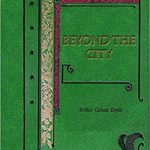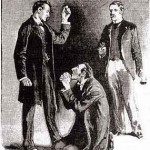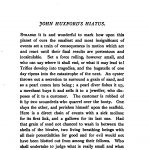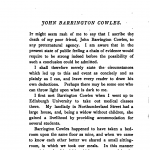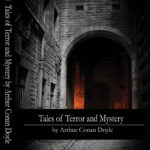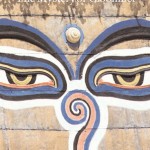April 25.—I was laid up in bed for two days after my incredible adventure in the cavern. I use the adjective with a very definite meaning, for I have had an experience since which has shocked me almost as much as the other. I have said that I was looking round for someone who could advise me. There is a Dr. Mark Johnson who practices some few miles away, to whom I had a note of recommendation from Professor Saunderson. To him I drove, when I was strong enough to get about, and I recounted to him my whole strange experience. He listened intently, and then carefully examined me, paying special attention to my reflexes and to the pupils of my eyes. When he had finished, he refused to discuss my adventure, saying that it was entirely beyond him, but he gave me the card of a Mr. Picton at Castleton, with the advice that I should instantly go to him and tell him the story exactly as I had done to himself. He was, according to my adviser, the very man who was pre-eminently suited to help me. I went on to the station, therefore, and made my way to the little town, which is some ten miles away. Mr. Picton appeared to be a man of importance, as his brass plate was displayed upon the door of a considerable building on the outskirts of the town. I was about to ring his bell, when some misgiving came into my mind, and, crossing to a neighbouring shop, I asked the man behind the counter if he could tell me anything of Mr. Picton. “Why,” said he, “he is the best mad doctor in Derbyshire, and yonder is his asylum.” You can imagine that it was not long before I had shaken the dust of Castleton from my feet and returned to the farm, cursing all unimaginative pedants who cannot conceive that there may be things in creation which have never yet chanced to come across their mole’s vision. After all, now that I am cooler, I can afford to admit that I have been no more sympathetic to Armitage than Dr. Johnson has been to me.
April 27. When I was a student I had the reputation of being a man of courage and enterprise. I remember that when there was a ghost-hunt at Coltbridge it was I who sat up in the haunted house. Is it advancing years (after all, I am only thirty-five), or is it this physical malady which has caused degeneration? Certainly my heart quails when I think of that horrible cavern in the hill, and the certainty that it has some monstrous occupant. What shall I do? There is not an hour in the day that I do not debate the question. If I say nothing, then the mystery remains unsolved. If I do say anything, then I have the alternative of mad alarm over the whole countryside, or of absolute incredulity which may end in consigning me to an asylum. On the whole, I think that my best course is to wait, and to prepare for some expedition which shall be more deliberate and better thought out than the last. As a first step I have been to Castleton and obtained a few essentials—a large acetylene lantern for one thing, and a good double-barrelled sporting rifle for another. The latter I have hired, but I have bought a dozen heavy game cartridges, which would bring down a rhinoceros. Now I am ready for my troglodyte friend. Give me better health and a little spate of energy, and I shall try conclusions with him yet. But who and what is he? Ah! there is the question which stands between me and my sleep. How many theories do I form, only to discard each in turn! It is all so utterly unthinkable. And yet the cry, the footmark, the tread in the cavern—no reasoning can get past these I think of the old-world legends of dragons and of other monsters. Were they, perhaps, not such fairy-tales as we have thought? Can it be that there is some fact which underlies them, and am I, of all mortals, the one who is chosen to expose it?
May 3.—For several days I have been laid up by the vagaries of an English spring, and during those days there have been developments, the true and sinister meaning of which no one can appreciate save myself. I may say that we have had cloudy and moonless nights of late, which according to my information were the seasons upon which sheep disappeared. Well, sheep have disappeared. Two of Miss Allerton’s, one of old Pearson’s of the Cat Walk, and one of Mrs. Moulton’s. Four in all during three nights. No trace is left of them at all, and the countryside is buzzing with rumours of gipsies and of sheep-stealers.
But there is something more serious than that. Young Armitage has disappeared also. He left his moorland cottage early on Wednesday night and has never been heard of since. He was an unattached man, so there is less sensation than would otherwise be the case. The popular explanation is that he owes money, and has found a situation in some other part of the country, whence he will presently write for his belongings. But I have grave misgivings. Is it not much more likely that the recent tragedy of the sheep has caused him to take some steps which may have ended in his own destruction? He may, for example, have lain in wait for the creature and been carried off by it into the recesses of the mountains. What an inconceivable fate for a civilized Englishman of the twentieth century! And yet I feel that it is possible and even probable. But in that case, how far am I answerable both for his death and for any other mishap which may occur? Surely with the knowledge I already possess it must be my duty to see that something is done, or if necessary to do it myself. It must be the latter, for this morning I went down to the local police-station and told my story. The inspector entered it all in a large book and bowed me out with commendable gravity, but I heard a burst of laughter before I had got down his garden path. No doubt he was recounting my adventure to his family.
June 10.—I am writing this, propped up in bed, six weeks after my last entry in this journal. I have gone through a terrible shock both to mind and body, arising from such an experience as has seldom befallen a human being before. But I have attained my end. The danger from the Terror which dwells in the Blue John Gap has passed never to return. Thus much at least I, a broken invalid, have done for the common good. Let me now recount what occurred as clearly as I may.
The night of Friday, May 3rd, was dark and cloudy—the very night for the monster to walk. About eleven o’clock I went from the farm-house with my lantern and my rifle, having first left a note upon the table of my bedroom in which I said that, if I were missing, search should be made for me in the direction of the Gap. I made my way to the mouth of the Roman shaft, and, having perched myself among the rocks close to the opening, I shut off my lantern and waited patiently with my loaded rifle ready to my hand.
It was a melancholy vigil. All down the winding valley I could see the scattered lights of the farm-houses, and the church clock of Chapel-le-Dale tolling the hours came faintly to my ears. These tokens of my fellow-men served only to make my own position seem the more lonely, and to call for a greater effort to overcome the terror which tempted me continually to get back to the farm, and abandon for ever this dangerous quest. And yet there lies deep in every man a rooted self-respect which makes it hard for him to turn back from that which he has once undertaken. This feeling of personal pride was my salvation now, and it was that alone which held me fast when every instinct of my nature was dragging me away. I am glad now that I had the strength. In spite of all that is has cost me, my manhood is at least above reproach.
Twelve o’clock struck in the distant church, then one, then two. It was the darkest hour of the night. The clouds were drifting low, and there was not a star in the sky. An owl was hooting somewhere among the rocks, but no other sound, save the gentle sough of the wind, came to my ears. And then suddenly I heard it! From far away down the tunnel came those muffled steps, so soft and yet so ponderous. I heard also the rattle of stones as they gave way under that giant tread. They drew nearer. They were close upon me. I heard the crashing of the bushes round the entrance, and then dimly through the darkness I was conscious of the loom of some enormous shape, some monstrous inchoate creature, passing swiftly and very silently out from the tunnel. I was paralysed with fear and amazement. Long as I had waited, now that it had actually come I was unprepared for the shock. I lay motionless and breathless, whilst the great dark mass whisked by me and was swallowed up in the night.
But now I nerved myself for its return. No sound came from the sleeping countryside to tell of the horror which was loose. In no way could I judge how far off it was, what it was doing, or when it might be back. But not a second time should my nerve fail me, not a second time should it pass unchallenged. I swore it between my clenched teeth as I laid my cocked rifle across the rock.
And yet it nearly happened. There was no warning of approach now as the creature passed over the grass. Suddenly, like a dark, drifting shadow, the huge bulk loomed up once more before me, making for the entrance of the cave. Again came that paralysis of volition which held my crooked forefinger impotent upon the trigger. But with a desperate effort I shook it off. Even as the brushwood rustled, and the monstrous beast blended with the shadow of the Gap, I fired at the retreating form. In the blaze of the gun I caught a glimpse of a great shaggy mass, something with rough and bristling hair of a withered grey colour, fading away to white in its lower parts, the huge body supported upon short, thick, curving legs. I had just that glance, and then I heard the rattle of the stones as the creature tore down into its burrow. In an instant, with a triumphant revulsion of feeling, I had cast my fears to the wind, and uncovering my powerful lantern, with my rifle in my hand, I sprang down from my rock and rushed after the monster down the old Roman shaft.
My splendid lamp cast a brilliant flood of vivid light in front of me, very different from the yellow glimmer which had aided me down the same passage only twelve days before. As I ran, I saw the great beast lurching along before me, its huge bulk filling up the whole space from wall to wall. Its hair looked like coarse faded oakum, and hung down in long, dense masses which swayed as it moved. It was like an enormous unclipped sheep in its fleece, but in size it was far larger than the largest elephant, and its breadth seemed to be nearly as great as its height. It fills me with amazement now to think that I should have dared to follow such a horror into the bowels of the earth, but when one’s blood is up, and when one’s quarry seems to be flying, the old primeval hunting-spirit awakes and prudence is cast to the wind. Rifle in hand, I ran at the top of my speed upon the trail of the monster.
I had seen that the creature was swift. Now I was to find out to my cost that it was also very cunning. I had imagined that it was in panic flight, and that I had only to pursue it. The idea that it might turn upon me never entered my excited brain. I have already explained that the passage down which I was racing opened into a great central cave. Into this I rushed, fearful lest I should lose all trace of the beast. But he had turned upon his own traces, and in a moment we were face to face.
That picture, seen in the brilliant white light of the lantern, is etched for ever upon my brain. He had reared up on his hind legs as a bear would do, and stood above me, enormous, menacing—such a creature as no nightmare had ever brought to my imagination. I have said that he reared like a bear, and there was something bear-like—if one could conceive a bear which was ten-fold the bulk of any bear seen upon earth—in his whole pose and attitude, in his great crooked forelegs with their ivory-white claws, in his rugged skin, and in his red, gaping mouth, fringed with monstrous fangs. Only in one point did he differ from the bear, or from any other creature which walks the earth, and even at that supreme moment a shudder of horror passed over me as I observed that the eyes which glistened in the glow of my lantern were huge, projecting bulbs, white and sightless. For a moment his great paws swung over my head. The next he fell forward upon me, I and my broken lantern crashed to the earth, and I remember no more.
When I came to myself I was back in the farm-house of the Allertons. Two days had passed since my terrible adventure in the Blue John Gap. It seems that I had lain all night in the cave insensible from concussion of the brain, with my left arm and two ribs badly fractured. In the morning my note had been found, a search party of a dozen farmers assembled, and I had been tracked down and carried back to my bedroom, where I had lain in high delirium ever since. There was, it seems, no sign of the creature, and no bloodstain which would show that my bullet had found him as he passed. Save for my own plight and the marks upon the mud, there was nothing to prove that what I said was true.
Six weeks have now elapsed, and I am able to sit out once more in the sunshine. Just opposite me is the steep hillside, grey with shaly rock, and yonder on its flank is the dark cleft which marks the opening of the Blue John Gap. But it is no longer a source of terror. Never again through that ill-omened tunnel shall any strange shape flit out into the world of men. The educated and the scientific, the Dr. Johnsons and the like, may smile at my narrative, but the poorer folk of the countryside had never a doubt as to its truth. On the day after my recovering consciousness they assembled in their hundreds round the Blue John Gap. As the Castleton Courier said:
“It was useless for our correspondent, or for any of the adventurous gentlemen who had come from Matlock, Buxton, and other parts, to offer to descend, to explore the cave to the end, and to finally test the extraordinary narrative of Dr. James Hardcastle. The country people had taken the matter into their own hands, and from an early hour of the morning they had worked hard in stopping up the entrance of the tunnel. There is a sharp slope where the shaft begins, and great boulders, rolled along by many willing hands, were thrust down it until the Gap was absolutely sealed. So ends the episode which has caused such excitement throughout the country. Local opinion is fiercely divided upon the subject. On the one hand are those who point to Dr. Hardcastle’s impaired health, and to the possibility of cerebral lesions of tubercular origin giving rise to strange hallucinations. Some idee fixe, according to these gentlemen, caused the doctor to wander down the tunnel, and a fall among the rocks was sufficient to account for his injuries. On the other hand, a legend of a strange creature in the Gap has existed for some months back, and the farmers look upon Dr. Hardcastle’s narrative and his personal injuries as a final corroboration. So the matter stands, and so the matter will continue to stand, for no definite solution seems to us to be now possible. It transcends human wit to give any scientific explanation which could cover the alleged facts.”
Perhaps before the Courier published these words they would have been wise to send their representative to me. I have thought the matter out, as no one else has occasion to do, and it is possible that I might have removed some of the more obvious difficulties of the narrative and brought it one degree nearer to scientific acceptance. Let me then write down the only explanation which seems to me to elucidate what I know to my cost to have been a series of facts. My theory may seem to be wildly improbable, but at least no one can venture to say that it is impossible.
My view is—and it was formed, as is shown by my diary, before my personal adventure—that in this part of England there is a vast subterranean lake or sea, which is fed by the great number of streams which pass down through the limestone. Where there is a large collection of water there must also be some evaporation, mists or rain, and a possibility of vegetation. This in turn suggests that there may be animal life, arising, as the vegetable life would also do, from those seeds and types which had been introduced at an early period of the world’s history, when communication with the outer air was more easy. This place had then developed a fauna and flora of its own, including such monsters as the one which I had seen, which may well have been the old cave-bear, enormously enlarged and modified by its new environment. For countless aeons the internal and the external creation had kept apart, growing steadily away from each other. Then there had come some rift in the depths of the mountain which had enabled one creature to wander up and, by means of the Roman tunnel, to reach the open air. Like all subterranean life, it had lost the power of sight, but this had no doubt been compensated for by nature in other directions. Certainly it had some means of finding its way about, and of hunting down the sheep upon the hillside. As to its choice of dark nights, it is part of my theory that light was painful to those great white eyeballs, and that it was only a pitch-black world which it could tolerate. Perhaps, indeed, it was the glare of my lantern which saved my life at that awful moment when we were face to face. So I read the riddle. I leave these facts behind me, and if you can explain them, do so; or if you choose to doubt them, do so. Neither your belief nor your incredulity can alter them, nor affect one whose task is nearly over.
So ended the strange narrative of Dr. James Hardcastle.

